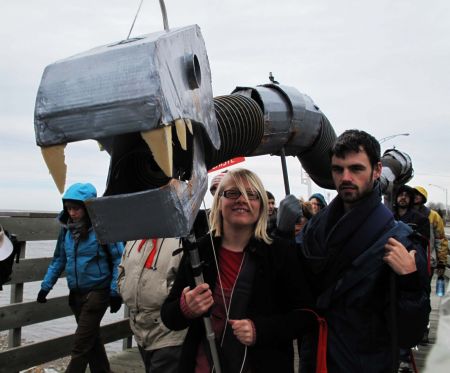“Building a new movement doesn’t come without ruffling some feathers,” says Philippe Duhamel, the spokesperson for La marche pour une moratoire d’une génération. He has already walked more than half of the 637 kilometres from Rimouski to Montreal in protest against the shale gas industry.
The march was ignited on May 16 after the provincial government refused the organizers’ request for a 20-year moratorium on shale gas exploration and exploitation in Quebec. The demonstration is founded on a passive form of non-violent direct action, an approach taken by many environmental groups, but Duhamel says organizers have not ruled out the possibility of civil disobedience to further impede the shale gas industry: “What’s becoming clear is that conventional means of protest will not achieve the ousting of the industry from Quebec at this point.”
The participants will arrive in Montreal on Saturday, congregating in front of Hydro-Québec where they will be joined by several other environmental organizations before continuing on to Premier Jean Charest’s office. Duhamel excitedly notes the Montreal event will mark the first demonstration of its kind on the shale gas issue. At the same time, it will add momentum to a strengthening environmentalist front in Quebec.
“2011 is a huge year for the environmental movement,” says Bruno Massé. “We’re seeing pretty much all the domains of energy in Quebec being activated at once.”
Massé is the general director of the Réseau québécois des groupes écologistes (RQGE), a network of some 80 provincial and national organizations which together cover what seems like every conceivable environmental issue.
The hearings regarding the dismantling of the nuclear power plant Gentilly-2, Jean Charest’s quarter-century mega project Plan Nord, ongoing debates over hydroelectric dams on La Romaine River (among others), and the controversies over the shale gas industry are examples Massé cites of spillover issues from 2010 that have continued to rage with increasing force in the new year.
Moratoriums are but one demand of environmental groups. Duhamel explains two decades is sufficient time in the case of shale gas for a comprehensive evaluation of the industry’s effects on Quebec’s environment. The moratorium would also put a halt to its already damaging impact, and allow time to invest in renewable energy alternatives: “We said: let our children decide whether this technology (hydraulic fracturing, or “fracking”) should be used or not.”
La marche pour une moratoire d’une génération has stopped in 29 cities so far with four more on its route covering the province’s main shale region: the Saint Lawrence Valley between Quebec City and Montreal. Along the way, the march has fluctuated in numbers, as people join in for a few hours to a few days at a time. Every stop features a “soirée de sensibilisation” that seeks to educate attendees on the shale gas industry and its connection to other environmental concerns. These evening meetings serve as social gatherings for story sharing, with performances by local musicians and artists.
“What we’re really witnessing with this walk is a weaving back together of a citizen-based network,” says Duhamel. “It’s really going to become the base for much bigger, much stronger, much more powerful action.”
But this remodeled network excludes the network: the RQGE. “We adopted the stance not to be a part of this campaign,” says Massé, despite the Saturday event being advertised, albeit under a different name, on their homepage. The RQGE found the planning of the march did not espouse the values promoted by the network, including democracy, solidarity and transparency—terms which are featured prominently on the march’s web site. Of most concern was that the organizers appeared to want to eclipse the efforts made by other groups.
Duhamel admits the march didn’t initially sit well with several groups involved in the shale gas issue in Quebec. The “new movement” by which Duhamel defines the march is in fact one that started soon after the discovery of significant shale deposits in the St. Lawrence valley in 2007, and the subsequent development of “fracking.”
Since then, various municipalities infiltrated by the shale gas industry, environmental bigwigs like Equiterre, and even the Parti Québécois have issued calls for moratoriums. The march, then, doesn’t represent anything new per se; but it has generated more media attention than any related event in the past.
The media is an important tool for the environmental movement, Massé says, but he warns that making a celebrity out of particular events—or their organizers—can detract from environmental group solidarity. The unification of these organizations is particularly vital during a year filled with just as much hardship as success.
According to Massé, most organizations are operating on a third of their previous budget—and some with no budget at all—as they attempt to recover from the Liberal government’s elimination of environmental group funding in 2005. Progress has also been stalled by a string of strategic lawsuits filed by corporations against organization members who published criticisms of the energy industry in the mainstream media.
Still, Massé says the past couple years have demonstrated a positive “paradigm shift” for Quebec’s 30-year-old environmental movement:
“Environmentalism use to be a bit like the niche subject for a couple groups and individuals,” he says. “Nowadays, the concept of sustainable development and concern for the environment has kind of leaked into every other aspect of society: the economy, politics—pretty much everywhere—but to very pale degrees.”
On this point, Duhamel agrees. He characterizes the Quebec environmental movement as one increasingly based on broader questions than land use and resources. People are beginning to demand more involvement in the province’s decision-making process as a result of barriers faced during environmental struggles. This drive for a more participatory, active democracy is the common link between environmental groups regardless of their area of focus, their approach, or their motivation. And it is this collective drive that will define the Quebec environmental movement’s next chapter.




